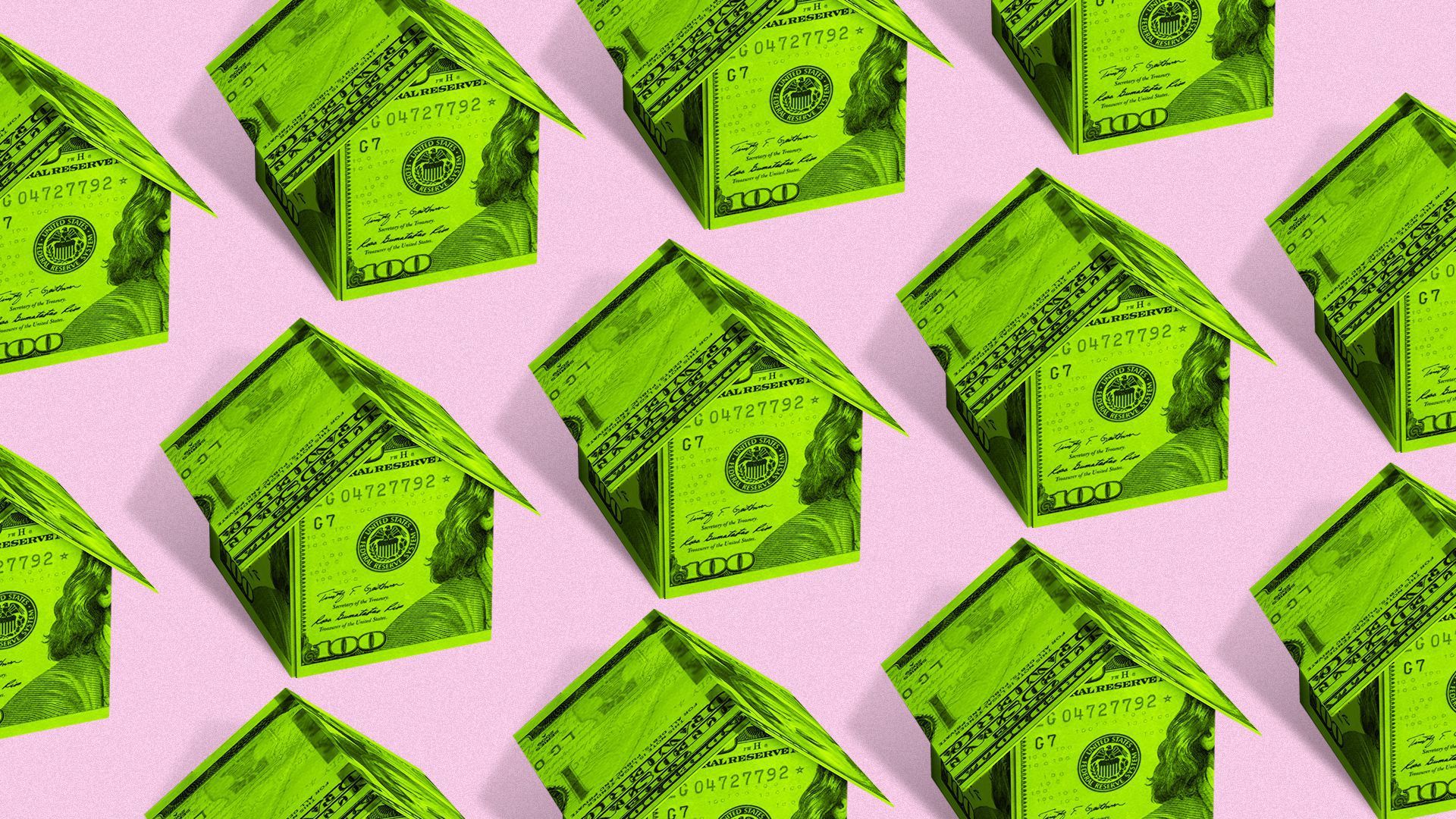| | | | | | | Presented By OurCrowd | | | | Axios Markets | | By Matt Phillips and Emily Peck · Jun 29, 2022 | | Hiya. Remember when everybody wanted stuff? It was COVID. We were bored. So we bought all the things ... bigger TVs, trampolines for the kids, patio furniture. Quite literally couldn't get enough of it! Well, things seem to have changed. Read on. Today's newsletter, edited by Kate Marino, is 1,187 words, 4.5 minutes. | | | | | | 1 big thing: Now we have too much stuff |  Note: Data not inflation-adjusted; Data: FactSet; Chart: Axios Visuals After two-plus years of on-again, off-again supply chain snarls, American warehouses and store shelves are filling up with stuff — perhaps too much, Matt writes. The big picture: Fresh government numbers out yesterday showed wholesale and retail stockpiles continue to mount, even as the ferocious consumer appetite for stuff — toys, clothes, furniture, packaged goods — that emerged as a feature of the pandemic economy may be ebbing. Context: A disappointing reading on retail sales a couple of weeks ago reinforced the view among some that surging inflation is unnerving American shoppers, and may change the buying patterns that developed during the COVID crisis. - Recent profit warnings from Walmart and Target, along with disappointing results from Amazon, made a similar point.
- Retailers conceded to Wall Street that they may have misjudged the kind of goods American households would want to buy as inflation strained their budgets.
- Target, for instance, said it ordered way too many televisions and home appliances that it'll have to put on sale.
💭 Our thought bubble: This is yet another example of one of our favorite themes here at Axios Markets ... "The stock market is not the economy." Let's just call it TSMINTE for short. - If you are a shareholder in Target, it's kind of a bummer that the company screwed up and now has to put a bunch of stuff on sale at lower prices. This means your profit margins are likely to fall. (That's why when Target happened to mention this problem, its share price fell the most in a single day since the 1987 market crash.)
- But if you're a shopper: score. Maybe that massive flat-screen you want is on sale. (Also, if you're Federal Reserve chair Jerome Powell, whose job is to pull inflation down to earth, it's good to get word that some prices are going to be discounted.)
- In other words, something that is kind of bad for the stock market is actually kind of good for the economy. This is the essence of TSMINTE!
Yes, but: Of course, there are limits to this kind of logic. If everybody makes huge inventory screw-ups and builds massive stockpiles of products for which there is no demand, that could conceivably be a bad thing. Companies could go out of business and people could lose their jobs. The bottom line: But for now, the surge in inventories, just as demand seems to be slowing down, is exactly what the U.S. economy needs to get a break from the inflation that's driving everybody crazy. And, you know, keep your eyes peeled for sales. |     | | | | | | 2. Catch up quick | | 💸 Embattled Disney CEO Bob Chapek gets 3-year extension. (Variety) ✨ Goldman taps Buffett and Paltrow in small biz push. (Axios) ⚖️ Court orders liquidation of crypto hedge fund Three Arrows Capital. (Sky News) |     | | | | | | 3. Big landlords in the hot seat (sort of) |  | | | Illustration: Aïda Amer/Axios | | | | The role big companies like Invitation Homes, American Homes 4 Rent and other investment firms play in the single-family home market came under congressional scrutiny yesterday, Emily writes. Why it matters: The number of institutional investors shot up after the 2008 financial crisis, and again during the housing boom of the past couple of years — yet details on the single-family rental market are relatively hard to come by. - Plus, the hearing comes at a time of soaring rents. Markets in some areas are so hot that bidding wars have taken place, the WSJ reported this week.
Driving the news: At the hearing, held by a House Financial Services subcommittee, Democratic lawmakers, advocates for affordable housing and academics criticized large firms for driving up rents and home prices — and for exacerbating the racial gap in wealth and homeownership. - Representatives from those firms didn't participate.
Background: A report this week by the subcommittee examined the role that the five largest institutional landlords play. Some highlights ... - In 2011, no single investor in the U.S. owned more than 1,000 homes. By the third quarter of 2021, the top five companies had 280,637 homes combined, according to data they provided to the committee.
- Corporate landlords evict tenants at higher rates than smaller landlords, per the report.
- Corporate landlords filed to evict at least 70,000 tenants between September and May of 2021 when the federal eviction moratorium was still in effect, according to data cited.
Yes, but: The crisis in affordability isn't the fault of these investment firms, said Jenny Schuetz, a senior fellow at the Brookings Institute, at the hearing. - "Since the Great Recession, the U.S. has not built enough housing, leading to historically low vacancy rates and rapidly rising costs. Private equity firms and other institutional investors benefit from tight housing supply, but they did not create the problem," she said.
|     | | | | | | A message from OurCrowd | | An alternative to today's turbulent stock market | | |  | | | | As rising interest rates and inflation throw the stock market into turmoil, savvy investors are turning to alternative investments. OurCrowd makes it easy for you to diversify your investments into a variety of expertly vetted, high-growth private companies. Learn more at OurCrowd. | | | | | | 4. For small biz owners, things are "weird" |  Inflation worries are soaring among small business owners, overtaking COVID-19 as a top concern, Emily writes. - But overall, these owners say that business is good right now, according to a survey released by the U.S. Chamber of Commerce today.
Why it matters: Once upon a time, COVID-19 seemed to pose an existential risk to the nation's small businesses. Now, the pandemic is in the rear view, and overall sentiment for these entrepreneurs is closing in on pre-COVID levels. - The survey showed that owners are seeing relatively good business conditions. Two-thirds anticipate revenue going up over the next year.
- And 43% intend to hire more staff — that's actually up from 37% who said so during Q1 2022.
- Still, many are worried about the overall economy. After all, most haven't lived through a time of rising prices like this.
"We're kind of in this weird moment," said Neil Bradley, executive vice president and chief policy officer at the Chamber of Commerce. - "Inflation has become the dominant concern, but today in this very moment demand for goods and services for small business is exceeding the levels that most business can even meet."
|     | | |  | | | | If you like this newsletter, your friends may, too! Refer your friends and get free Axios swag when they sign up. | | | | | | | | 5. 💬 Quoted: "turn the tables" | | "The Russians have been quite cynically manipulating gas markets and, to the extent they can, oil markets, so this would be a chance to turn the tables." — Simon Johnson, an economist at the Massachusetts Institute of Technology, on the price cap proposal that emerged at this week's G7 meeting, to the New York Times. Why it matters: The proposed price cap on Russian crude oil — essentially the formation of a crude oil buyers cartel among the U.S. and its allies — would be an attempt to block the massive oil revenues Russia has been able to reap as a result of its invasion of Ukraine, which drove energy prices sharply higher, Matt writes. Yes, but: It's unclear if the price cap plan can be put into action. And even if it was, Russia could always decide the price was too low, and simply stop selling it. - This would be bad for Russia, of course, which needs oil money. But it would also be bad for people in Europe who need Russian oil in the near term. And for those in the U.S., since a Russian embargo could induce a worldwide energy shock.
- Still, it could happen.
|     | | | | | | Bonus chart: Can someone check on Elon? |  Data: Twitter; Chart: Erin Davis/Axios Visuals Elon Musk celebrated his 100 millionth Twitter follower in uncharacteristic fashion: by not tweeting at all. In fact, he hasn't tweeted in over a week, Axios' Felix Salmon writes. |     | | | | | | A message from OurCrowd | | Invest beyond the volatility of today's stock market | | |  | | | | Every month, OurCrowd vets hundreds of startups and brings you a select few identified for their outsized growth potential. OurCrowd has helped accredited investors from more than 90 countries invest in growing tech companies. Invest beyond the stock market at OurCrowd. | | |  | It's called Smart Brevity®. Over 300 orgs use it — in a tool called Axios HQ — to drive productivity with clearer workplace communications. | | | | | | Axios thanks our partners for supporting our newsletters. If you're interested in advertising, learn more here.
Sponsorship has no influence on editorial content. Axios, 3100 Clarendon Blvd, Arlington VA 22201 | | | You received this email because you signed up for newsletters from Axios.
Change your preferences or unsubscribe here. | | | Was this email forwarded to you?
Sign up now to get Axios in your inbox. | | | | Follow Axios on social media:    | | | | | |
No comments:
Post a Comment